June 22, 2025 | 00:58 GMT +7
June 22, 2025 | 00:58 GMT +7
Hotline: 0913.378.918
June 22, 2025 | 00:58 GMT +7
Hotline: 0913.378.918
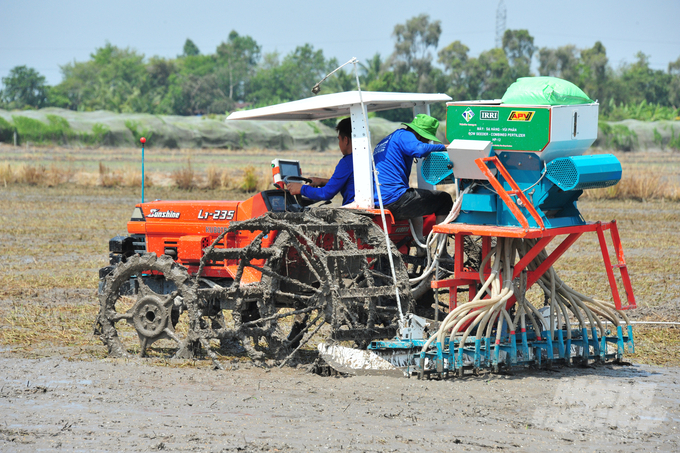
Thanks to the application of the row seeder, the amount of seed used in the model is only 80kg/ha. Photo: Le Hoang Vu.
Hiep Xuong commune in Phu Tan district has recently partnered with the An Giang Crop Production and Plant Protection Sub Department to implement a demonstration model for operating and evaluating the effectiveness of a row-seeding machine combined with fertilizer application. This initiative is part of the project "Sustainable development of 1 million hectares of high-quality, low-emission rice cultivation linked to green growth in the Mekong Delta".
The model will be applied to 15 hectares for the winter-spring season 2024, using the OM5451 variety with a seeding rate of 80 kg/ha and row spacing of 40x10 cm.
The demonstration model also applies the low-emission rice production technical process as guided by the Crop Production Department (Ministry of Agriculture and Rural Development), similar to the model implemented at Thuan Tien Cooperative (Thanh An commune, Vinh Thanh district, Can Tho City).
According to Dr. Nguyen Van Hieu, a specialist from the International Rice Research Institute (IRRI), preliminary harvest results in Can Tho City show a 50% reduction in seed quantity, a 30% reduction in fertilizer use, fewer pesticide applications, and a decrease in pesticide amounts (due to wider seeding allowing better root development and fewer plant diseases). Meanwhile, the yield reached 6.4 tons/ha, a 7% increase compared to surrounding areas, resulting in higher profits. Additionally, the model reduces CO2 emissions by 2-6 tons per hectare compared to non-model fields.
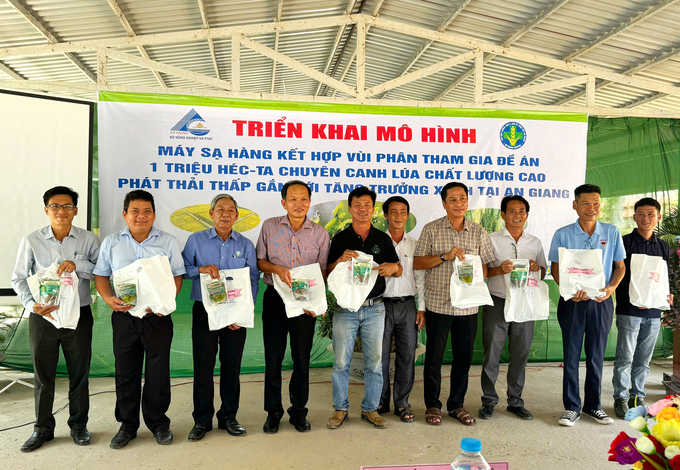
An Giang's agricultural sector has chosen Hiep Xuong commune, Phu Tan district, to demonstrate the province's first official model in implementing the 1 million hectare high-quality rice plan. Photo: Le Hoang Vu.
Mr. Tran Thanh Hiep, Deputy Director of the An Giang Department of Agriculture and Rural Development, stated that the province plans to sustainably develop over 44.000 hectares of high-quality rice cultivation by 2025, aiming to reach 152.198 hectares by 2030. Phu Tan district has registered 12.348 hectares for this goal by 2030 and is the fifth-largest area among the 11 districts and towns participating in the provincial plan.
To ensure the model's success, Mr. Tran Thanh Hiep emphasized that Phu Tan district needs to regularly communicate and collaborate with the Department of Agriculture and Rural Development to address challenges and promote the plan's success. This effort will contribute to the establishment and sustainable development of rice cultivation areas linked to green growth, thereby increasing the income of rice farmers.
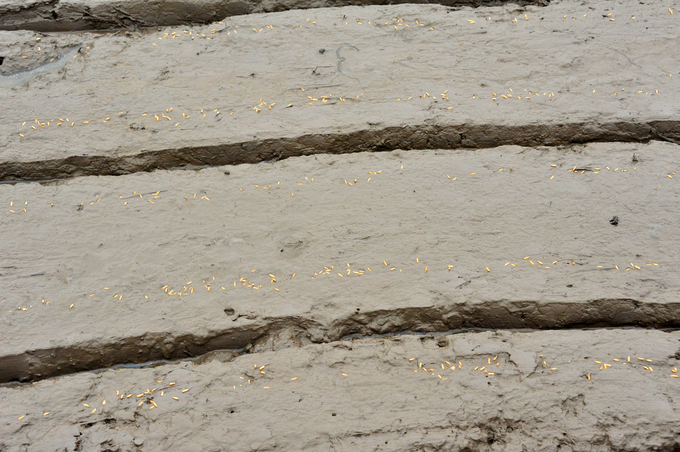
The low-emission rice growing model helps reduce the amount of seeds sown by 50% and the amount of fertilizer by 30%. Photo: Le Hoang Vu.
Additionally, it is essential to focus resources on promoting the establishment and stable development of cooperatives, as these are a key component that significantly contributes to the value chain and represents the correct direction for the rice industry in the future.
Phu Tan district should also proactively assign specialized departments to leverage both budgetary and social resources to develop models according to the criteria of the 1 million hectare high-quality rice cultivation process. This groundwork will help drive widespread outreach and awareness among the local population.
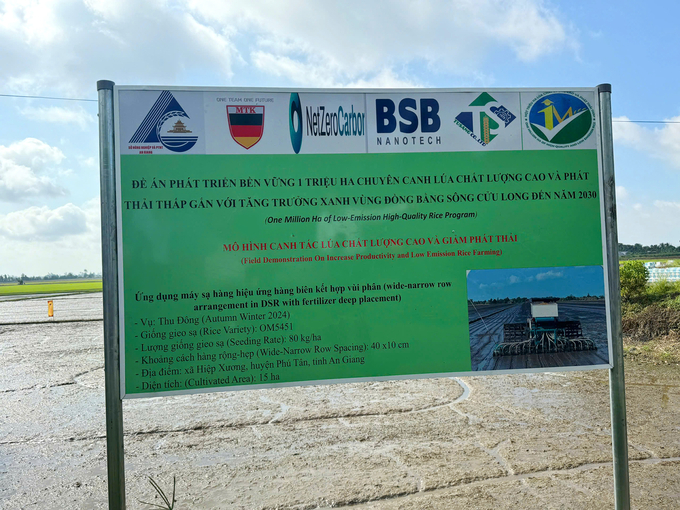
After implementing the pilot model in Hiệp Xương commune, the An Giang Department of Agriculture and Rural Development will continue to organize demonstration models for high-quality rice cultivation and emission reduction in other areas, as a basis for evaluation and replication. Photo: Le Hoang Vu.
Mr. Hiep emphasized that the local authorities need to actively invite businesses to participate in the rice value chain, as they are an indispensable part of this plan. It is hoped that businesses will invest and collaborate in the near future, providing farmers with favorable access to high-quality inputs at reasonable prices. This collaboration will also facilitate the application of advanced techniques, helping to reduce production costs and enhance efficiency.
"After implementing the pilot model in Hiep Xuong commune, the An Giang Department of Agriculture and Rural Development will continue to organize demonstration models for high-quality rice cultivation and emission reduction in other areas. These will serve as a basis for evaluating, scaling up, and implementing the project 'Sustainable development of 1 million hectares of high-quality, low-emission rice cultivation linked to green growth in the Mekong Delta' across An Giang province. An important goal of the project is not only to increase rice yield and quality but also to reduce costs, lower greenhouse gas emissions, promote green growth and move towards sustainable farming", said Mr. Tran Thanh Hiep, Deputy Director of the An Giang Department of Agriculture and Rural Development.
Translated by Phuong Linh
![Turning wind and rain into action: [11] Ten years before storms, after every harvest](https://t.ex-cdn.com/nongnghiepmoitruong.vn/608w/files/news/2025/06/20/z6704423696987_15fd32ffc26d590d204d520c9dac6786-nongnghiep-140922.jpg)
(VAN) With WeatherPlus, every raindrop and every breeze carries a message. And if we learn to listen, the fields will no longer live in fear of the weather.
![Turning wind and rain into action: [10] Advancing accessible climate services for farmers](https://t.ex-cdn.com/nongnghiepmoitruong.vn/608w/files/linhnhp/2025/06/20/1911-z6704423696987_15fd32ffc26d590d204d520c9dac6786-nongnghiep-161854.jpg)
(VAN) Not only does it help farmers 'avoid droughts and rains,' the development of agricultural climate services also enhances their ability to proactively adapt to a rapidly changing climate.
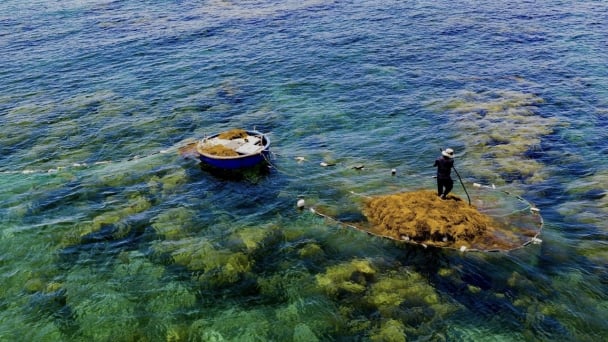
(VAN) With international assistance, the harvesting of sargassum seaweed in Quang Ngai has become increasingly regulated, thereby safeguarding marine life and ensuring the stability of coastal communities' livelihoods.
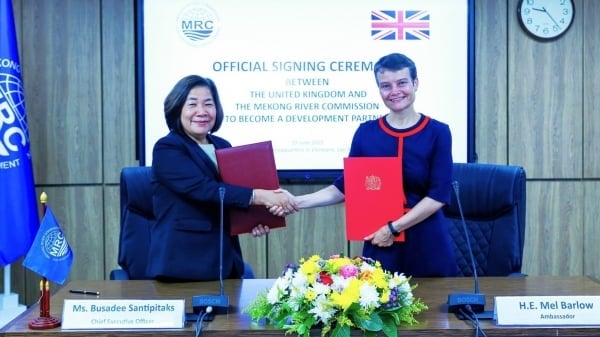
(VAN) On June 19, the United Kingdom officially became a Development Partner of the Mekong River Commission.

(VAN) Biodiversity is being threatened by traditional remedies made from wildlife. Traditional medicine and humans must change to live in harmony with nature.

(VAN) Agrifood investment and finance solutions for people and the planet.

(VAN) Microplastic contamination has become pervasive in seafood, posing unprecedented challenges for food safety and marine ecosystems.